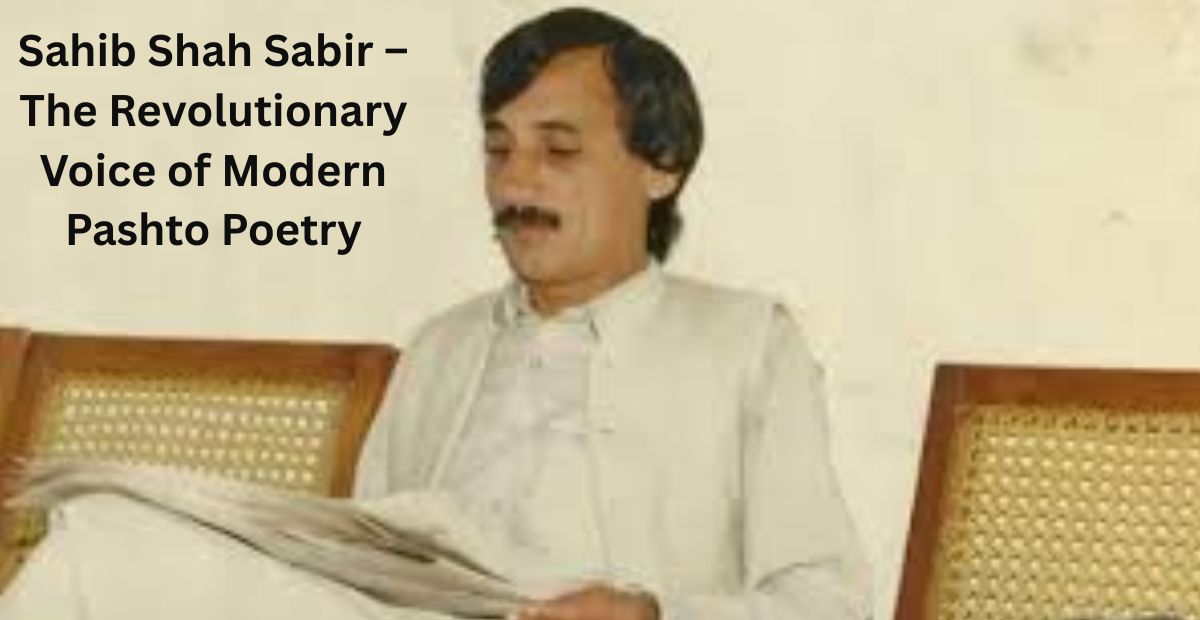Sahib Shah Sabir (1956–2007) remains one of the most iconic and influential voices in modern Pashto literature. A poet, scholar, and political activist, Sabir’s life and works reflect a rare blend of intellect, rebellion, and unwavering love for Pashtun culture and identity. His poetry continues to inspire generations of Pashtuns through both the written word and popular music.
Early Life and Education
Born in 1956 in the scenic Malakand Division of Khyber Pakhtunkhwa, Sahib Shah Sabir spent his formative years immersed in the traditions and stories of his people. He later moved to Peshawar, where he pursued his higher education and laid the foundation of his literary and political career.
Sabir’s academic journey was as impressive as his poetic contributions. He earned a PhD in Literature along with three master’s degrees—in Pashto literature, Urdu literature, and Political Science—all from the University of Peshawar.
A Rebel with a Cause
Known for his rebellious nature (سرکشه) and strong personality (خو داره انسان), Sahib Shah Sabir was an outspoken critic of societal norms and political injustices. His activism began in his student days, where he emerged as a prominent leader within the Pashtun Student Federation.
His friend and fellow poet Rehmat Shah Sail once described the electric atmosphere of those days, recalling Sabir’s leadership at Mardan College and the processions that followed. These weren’t just student protests—they were passionate declarations of Pashtun identity, infused with the rhythm of drums and poetry that lit up the streets till dawn.
A Rich Literary Legacy
Sabir’s poetry reflected his free-thinking ideals, often challenging traditional beliefs while promoting education, progress, and human dignity. His writing merged classical Pashto forms with modern themes, making his work both timeless and relevant.
Published Works:
- Takal – A celebrated collection of poetry.
- Khobona – Another remarkable poetry collection that touches on dreams, hope, and revolution.
- Waore aw Gulona – A short story collection.
- Pukhtana aw Pakhto Tappa – A research work on Pashto folk literature.
- Ranna aw Gulona – A collection of literary articles.
Unpublished Manuscripts:
- تنقید او د تنقید ډولونه – A deep dive into the types of literary criticism.
- په پښتو شاعرۍ کښي ټولنیز مافیعت – His MPhil thesis exploring social elements in Pashto poetry.
- رڼا او رنګونه – An unpublished collection of literary essays.
Poetry That Still Sings
Sahib Shah Sabir’s words continue to live on through music. His ghazals and nazms have been immortalized by popular Pashto singers, including Karan Khan, who released a full audio album titled Bya Hagha Makham De. The legendary Sardar Ali Takkar has also lent his voice to Sabir’s verses, bringing them to even broader audiences.
One of Sabir’s most quoted couplets reflects his vision and struggles:
ذرې ذرې شي چې رڼا ته رسي لمر ته رسي
ستوري د سختو نه تېريږي چې سحر ته رسي
(Translation: Every particle must endure hardship to reach the light of the sun. Stars must survive the darkness to arrive at dawn.)
Political Thought and Personal Beliefs
Deeply influenced by global revolutionary ideas, Sabir believed that the Pashtun people could only compete with the world through science, education, and awareness. He often emphasized that progress required challenging outdated traditions and embracing modernity.
He once boldly declared:
“په ما هم هغه څوک د کفر ګواهي ورکوي
څوک چې زما په زور محراب ته ځي، ممبر ته رسي”
(Translation: I am accused of heresy by those who use my struggle to climb to the pulpit and gain influence.)
Legacy and Death
Sahib Shah Sabir passed away on April 3, 2007, in Peshawar. Though gone, his legacy lives on through his powerful poetry, political activism, and scholarly contributions to Pashto literature.
He is remembered not only as a literary genius but as a cultural icon who gave voice to the dreams, pains, and aspirations of his people.
Conclusion
Sahib Shah Sabir was more than a poet—he was a visionary, reformer, and voice of the Pashtun nation. His work serves as a beacon for youth, urging them to seek knowledge, challenge oppression, and stay rooted in their cultural identity. His poetry continues to echo across valleys and hearts, as timeless as the mountains of Malakand from where he came.
Keywords: Sahib Shah Sabir, Pashto poet, Pashto poetry, Karan Khan, Pashtun literature, Peshawar, Pashto Ghazals, Rehmat Shah Sail, Sardar Ali Takkar, Pashto culture, modern Pashto writers
Would you like a version of this blog post optimized for WordPress or Medium?
